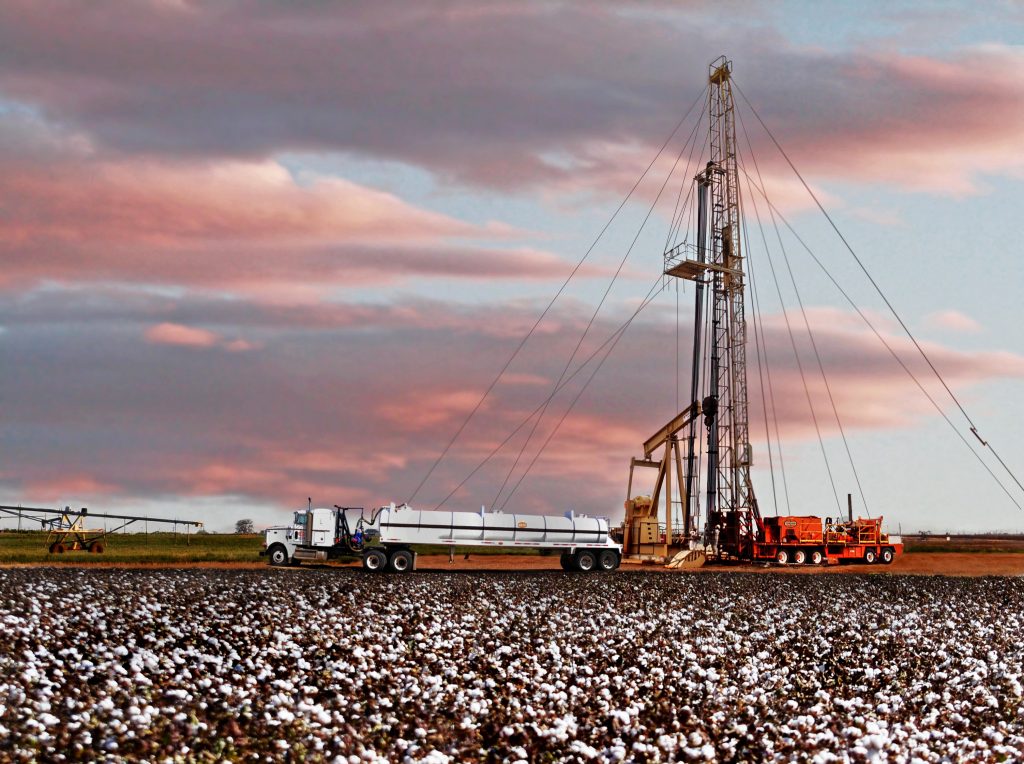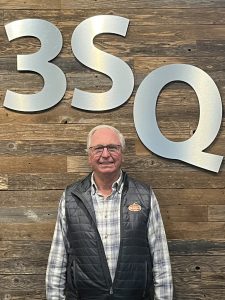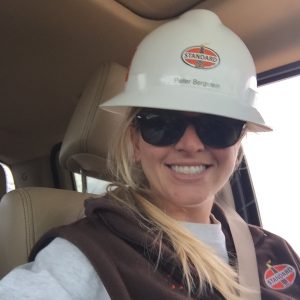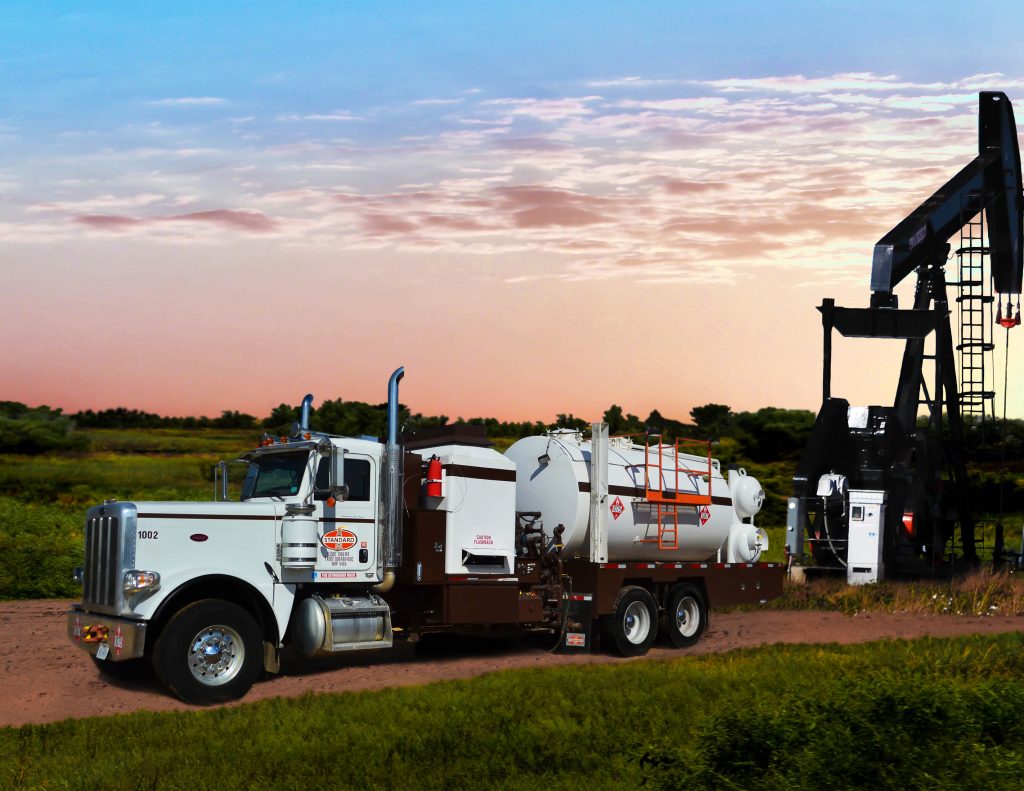Standard Energy Services Founder and President Pieter Bergstein started his company with no down payment on one hot oil truck. Today Standard has 350 employees and additional services—including vacuum trucks, pump trucks, well service, saltwater disposal, and others, along with hot oiling. This company that, over the years, has been asked to help clean up the Exxon Valdez spill and has won awards for its safety records, is now ready for a leadership transition.
Now Bergstein is looking to the future, planning for his daughter Saskia Allen to assume the company’s reins in the near future.
Bergstein himself has followed an enterprising path. After getting a Masters in economics and management with a focus on banking in Switzerland, Holland native Bergstein emigrated to the United States, planning on a banking career, but quickly discovering that, without a work permit, he couldn’t bank.
“So I ended up working in the oilfields in Post, Texas, on a pulling unit,” he recalled. From there he moved through being a roustabout to hot oiling, all for the same employer and the same customer. One day that customer approached Bergstein, applauding his work, but wanting the company to upgrade his hot oil truck and complaining that Bergstein’s employer was balking.
Soon Bergstein and the customer became friends, as the Holland native was able to give the latter some touring advice for a trip he was planning to the Netherlands. Bergstein expressed willingness to buy his own hot oil truck to meet the customer’s standards—but admitted he lacked the finances. Soon the E&P owner introduced and recommended Bergstein to a banker friend who financed the truck 100 percent.
That was in 1980. From there, the company grew rapidly. By 1986 they had 47 hot oil trucks, making Standard the largest hot oil company in the United States, Bergstein said. He also added vacuum trucks and pump trucks to boost cash flow during summers when hot oiling demand drops. By 2017 they had around 500 trucks.
Soon after, as the market for truck drivers became more competitive and with many hired away by produced water haulers, Bergstein decided to dial back the business. “We felt like it was better to be smaller and be in position to give better service to customers.”
That decision was based on the human element—and humility. “When you’re young you think you’re bulletproof, you want to be big. Then you get older and start noticing it’s not the ego that makes your business successful. It’s the people you have working for you, and if you have 500 drivers it’s hard to get to know everybody.” Now he knows almost all of the current drivers by first names, “And that makes a lot better company.” It also improves customer relations. “We have a lot of very loyal, very steady customers,” he said. Standard has MSA’s with about 300 with of them.
Exxon Valdez
One day in 1989 Bergstein arrived at work around 5 a.m. to find Exxon calling frantically. The Valdez had, in a now-famous incident, run aground and spilled much of its oil cargo. “They asked if we would be interested in sending hot oil equipment to the Valdez,” he recalled. The company dispatched 11 trucks to Alaska to pump hot water on the beach’s rocks, to soften the oil and push it out to sea, where skimmers could scoop it up.
Staying Safe
Every location has regular safety meetings, and Bergstein or Allen try to attend every one. Standard’s safety mantra revolves around “Three S Q,” translating to Safety, Service, Satisfaction, and Quality. That safety focus is particularly evident in two situations.
One involved a Denver City meeting with Shell, who wanted to reduce incidents involving trucks backing up on job sites. As Bergstrom drove into the tiny but bustling oil town, he noticed some utility trucks parked with a safety cone in place behind each one. At the meeting, he notified Exxon that Standard would start placing cones behind their own trucks—and Exxon decided to require cones on all service company trucks after that. From there, cones became standard procedure across most producers, Bergstein said.
Then in March of this year, Oxy gave Standard a safety award for their idea of putting on alarms—similar to those that sound when a truck is in reverse—when vehicle turn signals are activated. That’s necessary, Bergstein explained, “Because now, with everybody looking at their phones [when they’re] on the sidewalks, crossing the street, people don’t see blinkers anymore,” but they are more likely to hear and respond to the beep.

Standard services a well in the cotton country of the panhandle. The company stays very active in the Permian as well.
Passing the Baton: From Caviar to CEO
As a CPA, daughter Saskia Allen says she had worked at learning the business from the management side. Then she and her sister took a few years in San Francisco running a caviar company they’d founded. But Allen’s now-husband was in Lubbock, so she returned to the family business in 2018.
In the transition, she says, “I learned everything from the ground up. I chased vacuum trucks all over the place,” learning all about the workings of the equipment and the company, rising to her current position as vice president. Bergstrom is in the field 75 percent of the time, while Allen is in the office 75 percent of the time, she said. The elder stressed the importance of a seamless transition as he nears retirement.
An Oilfield Woman: Knowledgeable, Professional, Direct
Although women are increasingly becoming oilfield leaders, Allen faces the double issue of also being descended from the owner. She says she’s well accepted because employees have seen her in the field. (“In my FRs,” she said.) And they understand that she has earned her keep.
“As a woman in the oilfield, we have to make sure that we maintain a very professional demeanor,” Allen said. At client meetings with majors, the number of women in leadership is growing, according to Allen. And within Standard itself, “We have yards where almost 50 percent of our drivers are women.”
She continued, “I think the most important thing for a woman in the industry is you have to be knowledgeable about what you’re talking about. It’s important to be knowledgeable, professional, and direct. And the respect comes with that.”
Being the owner’s daughter, she holds herself to strict standards. “I’m the only employee whose vacation time isn’t counted. I take half the vacation that most people take because I feel the pressure there. I do feel like I have to earn my respect. I knew coming into this position where I was starting, where I wanted to go with it, and that I was going to have to earn every bit of it.”














